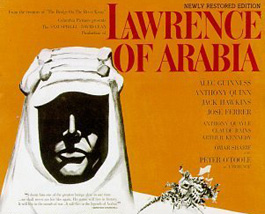home | metro silicon valley index | movies | current reviews | film review

Plenty O'Toole: 'Lawrence of Arabia' comes to downtown San Jose's California Theater.
This Week's Revivals
By Richard von Busack
![]() Beau Geste
Beau Geste
(1926) Concerning the disappearance of the Blue Water sapphire, the penance of three well-born English brothers in the Sahara and the mysterious fate of Fort Zinderneuf. In this smash hit of the silent cinema, the title role's Ronald Colman perfected the character that made him beloved worldwide: a man in playful combat with mortality, whose code is more important than the ordinary concerns of living or dying. Jim Riggs at the Stanford's Wurltizer. (Depressed? Ashamed? Wanted by the police? Contact www.legionetrangere.fr/"Une nouvelle chance pour une nouvelle vie.") (Plays May 20-21 in Palo Alto at the Stanford Theatre.)
![]() Bulldog Drummond Strikes Back
Bulldog Drummond Strikes Back
(1934) "As awkward a situation, you Highness, as any I can remember. Empty-handed, entirely surrounded by villains armed to the teeth and thirsting for my blood. ... You'll notice that, uh, in spite of danger, I still remain calm and collected, keen and alert for the next move. What will it be ..."—Captain Hugh "Bulldog" Drummond, D.S.O., M.C. (Ronald Colman) to the sinister Prince Achmed (Warner Oland), as quoted in Ronald Colman: Gentleman of the Cinema by R. Dixon Smith. Here, Colman reprises his role as free-lance adventurer Hugh "Bulldog" Drummond, up against Prince Achmed (Warner Oland), who menaces London with an early application of biological terror. Loretta Young is the female lead; the director is the brisk Warner Bros. workhorse Roy Del Ruth. (Plays May 24-27 in Palo Alto at the Stanford Theatre.)
![]() Clive of India
Clive of India
(1939) Ronald Colman stars as Robert Clive, in an empire-friendly view of how the English conquered the subcontinent; includes elephants, Cesar Romero in a turban, and the Black Hole of Calcutta (the atrocity is presided over by all-purpose Hollywood ethnic Mischa Auer). (Plays May 17-19 in Palo Alto at Stanford Theatre.)
![]() The Late George Apley
The Late George Apley
(1947) A Boston patriarch (Ronald Colman) is dragged into the 20th century, thanks to his daughter Eleanor (Peggy Cummings). Director Joseph Mankiewicz (All About Eve) claimed a technical innovation here that's been used in many films since: a 360-degree panning shot that takes in the inertia of the Apleys right before they're about to tuck into Thanksgiving dinner. (Plays May 24-26 in Palo Alto at the Stanford Theatre.)
![]() Lawrence of Arabia
Lawrence of Arabia
(1962) David Lean's epic is a reminder of an age when movies weren't just big, but smart, too. It tells of Col. T.E. Lawrence, the British agent provocateur who stirred up nationalist revolt in "Mesopotamia" during World War I. The plan was to protect both the Suez Canal and the oil supply from the hostile Ottoman Empire of the Turks. The Arab world as we know it was precipitated by Lawrence, and the world has been reaping the benefits and suffering the consequences ever since. What this movie is about is a man, played by the messianically beautiful young Peter O'Toole, and his friend Ali (another looker, Omar Sharif). The two battle against the sadistic Turks, particularly the Bey Jose Ferrer, whose mistreatment of Lawrence is a little more clear in the uncensored versions. The photography in Super Panavision 70 by Freddie Young made this a monster hit. The ultrawidescreen technique is given a rare demonstration in the splendid California Theatre in downtown San Jose for a paltry $7. Coming next week: Oklahoma! (Plays May 23-27 at 7pm in San Jose at the California Theatre; additional shows at 2 and 5 on May 27 only.)
![]() The Light That Failed
The Light That Failed
(1935) A war-wounded artist (Ronald Colman) makes a splash in a London whose effeteness disgusts him. He finds that his vision is leaving him; his last chance for greatness depends on an angry, half-starved street waif (Ida Lupino). Accurately adapted from Rudyard Kipling's novel, this tragedy was recently restored. William Wellman directs. (Plays May 17-20 in Palo Alto at the Stanford Theatre.)
![]() Lust for Life/Tea and Sympathy
Lust for Life/Tea and Sympathy
(Both 1956) Kirk Douglas as Van Gogh in Vincente Minnelli's serious and effective version of the painter's tragedy, made without the patronized, sweetened quality of most artists' biopics done in the studio era. While there's truth to the underplaying of Tim Roth in the Altman version, and how Roth shows the smaller-than-life side of the former coal-miner turned painter, Douglas captures the oversized nature of Van Gogh's fury. Anthony Quinn plays Gauguin, who finally has enough of the great man's distempered life. Reading Minnelli's autobiography, I Remember It Well (which ought to be titled I Remember It Selectively), it's worth noting how much worry he put into the scene of Van Gogh taking a razor to himself—concerns that are extinct in the era of movies like Saw. BILLED WITH Tea and Sympathy. The noted issue play brought to the screen, with a pair of tongs: the story of an introverted boy (John Kerr) who finds solace in friendship with his schoolmaster's wife (Deborah Kerr). Tom "Billy Jack" Laughlin plays the ringleader of the tormentors, to use Morrissey's phrase. (Plays May 21-23 in Palo Alto at the Stanford Theatre.)
Send a letter to the editor about this story.
|
|
|
|
|
|